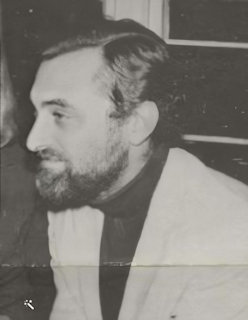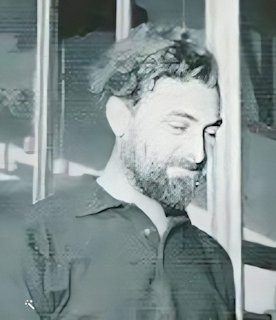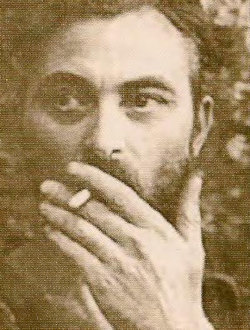|
 We are very sorry to have to report the death of James Saunders on 29 January at the age of 79. We are very sorry to have to report the death of James Saunders on 29 January at the age of 79.
Described as "one of the most prolific and unpredictable dramatists of his
generation", Saunders was closely associated with The Questors during the
sixties and seventies and he did much to help establish our international
reputation as a focus for new writing. Much of his earlier work was premiered
here, including one of his best known plays, Next Time I'll Sing To You (1962). Over the years we have produced more than twenty of his plays and he will
always hold a special place in our thoughts.
James Saunders was a personal friend of many of us, and he will be sadly
missed. We will carry a proper and full appreciation of his contribution to the life
of The Questors in our next issue. Friends or colleagues who would like to
contribute are invited to contact the editor.
Meanwhile, we can reflect on a thoughtful reply he gave when asked whether his
play A Scent of Flowers was about life or about death:
"It's an unreal question. It's about both. I mean, you can't really separate them.
You can be alive, but you can't feel alive unless you have an awareness of death.
The more nearly you can superimpose the two opposites, the more vivid they
become. To paint light, you put in shadows; to paint darkness, you put in a shaft
of light. To really feel light, you need to have been blind."
JAMES SAUNDERS
1925-2004
A TRIBUTE
By Peter Whelan
 I once got well and truly "Jimmed" in mid-conversation. I was airily advancing the
theory (God knows why...) that the cave dwellers of northern Spain painted scenes of bison being hunted in order to ensure a successful hunt for the tribe.
But Jim interrupted: "Why does it have to be for anything? Why couldn't the
caveman have simply woken up that morning thinking: I know what...I'll paint a
bison being hunted today." I once got well and truly "Jimmed" in mid-conversation. I was airily advancing the
theory (God knows why...) that the cave dwellers of northern Spain painted scenes of bison being hunted in order to ensure a successful hunt for the tribe.
But Jim interrupted: "Why does it have to be for anything? Why couldn't the
caveman have simply woken up that morning thinking: I know what...I'll paint a
bison being hunted today."
Jim had this central anxiety that we should not be tyrannised by theories. We
should focus instead on people, give thanks for their individuality and, where
tragedy strikes, attend to their grief.
A Cup of Cocoa and A Three- Legged Dog
When I first met him in the heady Post Godot era of the fifties his work was a
revelation to me. It shone with truth...often realised through laughter or surreal
visions. In Barnstable, one of the first plays he offered The Questors, a country
house gradually disintegrates around a woman who calmly goes on dispensing"cocoa for all".
In another early play of his, The Ark, one of Noah's sons tries to persuade his
father that he should take on board a three-legged dog seen wandering the
streets of the doomed city. The Ark already had two four-legged dogs but couldn't the three-legged count as a separate species? I caught myself marvelling at the inspired urgency of the argument. This was the onset of the nuclear age. Who wasn't in the Ark was Jim's concern.
Food for Thought
I loved the man. There was no conversation that was not improved by his
presence. You had to be careful - his words could sting - but his actions were
kindness itself. He was a generous maker of breakfasts and had an entire
philosophy concerning the best way to cook thick back bacon. I'll remember him building sandcastles on Cornish beaches, or pronouncing solemnly on what
should go into a picnic basket. In dark December he would do the rounds before
Christmas, bearing gifts of superb jam from his country garden in Eastleach.
And all found its way into his work the small human change of everyday life is
interwoven with the most lyrical poetic vision and the weightiest of thoughts. His
voice lives...even though the favourite pipe, used to punctuate his arguments,
remains strangely unlit.
OUR OLD 'PLAY' MATE
by Larry Irvine
 Jim was a playwright and a family man. He and his family were very easy to love, and our two families became very close — and still are to this day — when we found ourselves living in the same house Jim was a playwright and a family man. He and his family were very easy to love, and our two families became very close — and still are to this day — when we found ourselves living in the same house
in Ealing Common, not long after we first met. He and I bonded — as they say
when we discovered we had quite a lot in common. For a start our ages and
backgrounds were similar, both being brought up in North London: at one time even in adjacent streets. We also shared the same tastes in theatre, corny jokes,
pints of beer and life in general.
Humour
Although his erudition, word power, sense of fun and irony was well revealed in
his writing, there was also a clownish showoff side of him that, although always
there, his more dominant introvert nature allowed out only on special occasions.
This is the bit I felt I could do for him and could always tell when his silly moments needed an airing.
Generosity
His generosity was extreme to a point of vulnerability that you felt needed
protecting. But not only in the material sense. He was also over generous with
praise for anything he thought you could do better than he. On one occasion, and
how many there were, when I was complimenting him on a play, I said how I
envied him his talent. His reply was "Yes - but I can't tap dance."
Maybe not, but he certainly could "Sing" to us - and that is something that will never die.
JAMES SAUNDERS' PLAYS AT THE QUESTORS
|
